 W
WThe Alliance for Democracy and Reforms was a governing coalition in Moldova between numerous non-Communist parties which had absolute majority in the Moldovan Parliament after the 1998 parliamentary election.
 W
WThe cabinet of Fredrik Reinfeldt was the cabinet of Sweden from 2006 to 2014. It was a coalition cabinet consisting of the four parties in the centre-right Alliance for Sweden: the Moderate Party, Centre Party, Liberal People's Party and the Christian Democrats.
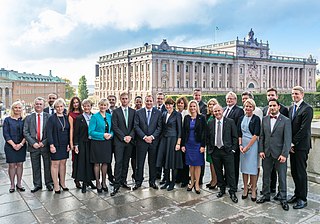 W
WThe first cabinet of Stefan Löfven was the cabinet of Sweden between 2014 and 2018. It was a coalition government, consisting of two parties: the Social Democrats and the Green Party. The cabinet was installed on 3 October 2014, following the 2014 general election. It lost a vote of no confidence following the 2018 election, but remained in office as a caretaker government. Löfven was reelected as Prime Minister in January 2019, thus forming the second cabinet of Stefan Löfven.
 W
WThe second cabinet of Stefan Löfven is the present Government of Sweden. It is a coalition, consisting of two parties: the Social Democrats and the Green Party. The cabinet was installed on 21 January 2019, following the 2018 general election.
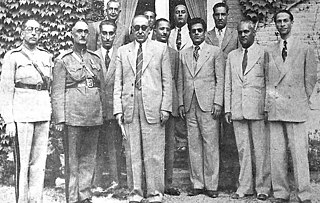 W
WPrime Minister Ahmad Qavam formed a short-lived coalition government on 1 August 1946 with his Democrat Party of Iran and the left-wing Tudeh Party and Iran Party. He offered three portfolios to the communists and gave the ministries of finance and communications to two royalists; while maintained his own control over interior and foreign ministries.
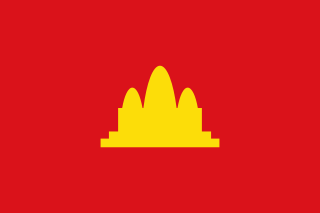 W
WThe Coalition Government of Democratic Kampuchea, renamed to the National Government of Cambodia from 1990, was a coalition government in exile composed of three Cambodian political factions, namely Prince Norodom Sihanouk's FUNCINPEC party, the Party of Democratic Kampuchea and the Khmer People's National Liberation Front (KPNLF) formed in 1982, broadening the de facto deposed Democratic Kampuchea regime. For most of its existence, it was the internationally recognized government of Cambodia.
 W
WThe Fifth Labour Government of New Zealand was the government of New Zealand from 10 December 1999 to 19 November 2008. Labour Party leader Helen Clark negotiated a coalition with Jim Anderton, leader of the Alliance Party. While undertaking a number of substantial reforms, it was not particularly radical compared to previous Labour governments.
 W
WThe First Filat Cabinet was the Cabinet of Moldova between September 25, 2009 and January 14, 2011. It was a caretaker cabinet from the election of November 28, 2010, until it was succeeded by the Second Filat Cabinet on January 14, 2011.
 W
WThe Second Filat Cabinet was the Cabinet of Moldova from 14 January 2011 to 30 May 2013. The Cabinet consisted of ministers from the Liberal Democratic Party of Moldova, the Democratic Party of Moldova, and the Liberal Party, who together formed the Alliance for European Integration. It was the second government to be led by Vlad Filat who was Prime Minister from 2009 until 2013. The Cabinet was installed after a successful vote of confidence held in the Parliament of Moldova on 14 January 2011.
 W
WThe Filip Cabinet was the Cabinet of Moldova led by Pavel Filip from January 2016 to June 2019.
 W
WThe First Kurz government was the 30th Government of Austria in office from 18 December 2017 until 3 June 2019. It succeeded the Kern government formed after the 2017 legislative election. Sebastian Kurz, chairman of the centre-right Austrian People's Party, known by its initials in German as ÖVP, reached an agreement on a coalition with the far-right Freedom Party of Austria (FPÖ), setting the stage for Kurz to become chancellor of Austria—the youngest head of government in Europe—for the first time.
 W
WThe Government of National Unity, also known as the "grand coalition cabinet," was a designation for the coalition government in Kenya from April 2008 to April 2013. It was formed through negotiations between the Orange Democratic Movement's leader and presidential candidate Raila Odinga and Party of National Unity's leader and incumbent presidential candidate Mwai Kibaki in the aftermath of the 2007–2008 Kenyan crisis which had followed the controversial 2007 presidential election.
 W
WThe Great Coalition was a grand coalition of political parties that brought the two Canadas together in 1864. The previous collapse after only three months of a coalition government formed by George-Étienne Cartier and Conservative John A. Macdonald and liberal George Brown, had demonstrated that continued governance of Canada East and Canada West under the 1840 Act of Union had become untenable. In order to reform the political system, a coalition was formed between the Clear Grits under George Brown, the Parti bleu under George-Étienne Cartier, and the Liberal-Conservatives under John A. Macdonald. The formation of this coalition took place between June 14 and June 30, 1864 and was officially completed on June 22, 1864 under George-Étienne Cartier and John A. Macdonald, as the colonies of the Canadas, and was significant to Canadian Confederation in 1867. The coalition persisted by the government of the Province of Canada until the moment of Confederation.
 W
WThe Royal Government of the National Union of Kampuchea was a government-in-exile of Cambodia, based in Beijing, that was in existence between 1970 and 1976, and was briefly in control of the country starting in 1975.
 W
WThe second cabinet of Per Albin Hansson was the cabinet of Sweden from 1936 to 1939. It was a coalition cabinet consisting of the two parties: Social Democrats and the Farmers' League.
 W
WIn June 1986, Sadiq al Mahdi formed a coalition government with the Umma Party, the Democratic Unionist Party (DUP), the National Islamic Front (NIF), and four southern parties. Unfortunately, however, Sadiq proved to be a weak leader and incapable of governing Sudan. Party factionalism, corruption, personal rivalries, scandals, and political instability characterized the Sadiq regime. After less than a year in office, Sadiq al Mahdi dismissed the government because it had failed to draft a new penal code to replace the sharia, reach an agreement with the IMF, end the civil war in the south, or devise a scheme to attract remittances from Sudanese expatriates. To retain the support of the DUP and the southern political parties, Sadiq formed another ineffective coalition government.
 W
WThe Fourth Cabinet of Kim Kielsen was the Government of Greenland, in office between 15 May 2018 and 5 October 2018, where the coalition collapsed with the party Partii Naleraq leaving the coalition following a dispute of the funding of new international airports It was a coalition majority government consisting of Siumut, Atassut, Nunatta Qitornai and Partii Naleraq.
 W
WThe Fifth Cabinet of Kim Kielsen was the Government of Greenland, in office between 5 October 2018 and 9 April 2019. It was a coalition minority government consisting of Siumut, Solidarity and Descendants of Our Country.
 W
WThe Sixth Cabinet of Kim Kielsen was the Government of Greenland, in office between 9 April 2019 and 29 May 2020, where Kielsen VII Cabinet took over. It was a coalition minority government consisting of Siumut and Descendants of Our Country.
 W
WThe seventh Cabinet of Kim Kielsen was the Government of Greenland in office from 29 May 2020 to 8 February 2021. It was a coalition minority government consisting of Siumut, the Democrats and Nunatta Qitornai.
 W
WThe eight Cabinet of Kim Kielsen is the incumbent Government of Greenland in office since 8 February 2021. It is a coalition minority government consisting of Siumut and Descendants of Our Country.
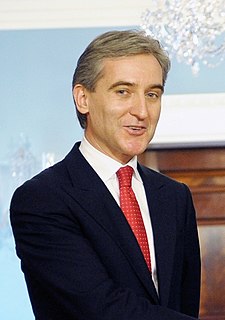 W
WThe Leancă Cabinet was the Cabinet of Moldova from 30 May 2013 to 18 February 2015. The Cabinet consisted of ministers from the Liberal Democratic Party, the Democratic Party, and the Liberal Reformist Party, a splinter group from the Liberal Party, who together formed the Pro-European Coalition. The Cabinet was installed after a successful vote of confidence held in the Parliament of Moldova on May 30, 2013.
 W
WThe Lumumba Government, also known as the Lumumba Ministry or Lumumba Cabinet, was the first set of ministers, ministers of state, and secretaries of state that governed the Democratic Republic of the Congo under the leadership of Prime Minister Patrice Lumumba from 24 June until 12 September 1960. The government inherited many problems from the era of the Belgian Congo, a tightly administered colony which for most of its existence had few political freedoms. Its members came from different social classes, different tribes, and held varied political beliefs. Weak and divided, its tenure was dominated by a widespread mutiny in the army and two secessions. An exodus of thousands of Belgian functionaries—who had controlled most of the bureaucracy—left the administration in disarray. The United Nations created a large multinational peacekeeping force to assist the government in reestablishing law and order. Western nations were under the impression that Lumumba was a communist, and the United States, Belgium, and France all worked to undermine and divide his government. Domestic opposition to the government cemented by late July, and Lumumba increasingly relied on only a few advisers, and rarely consulted the full Council of Ministers; several members of the government began acting without his direction. He resorted to increasingly authoritarian measures to maintain control over the country.
 W
WThe Palestinian National Unity Government of March 2007 was a Palestinian Authority unity government from March to June 2007, headed by Ismail Haniyeh, the Prime Minister of the Palestinian National Authority.
 W
WThe Palestinian Unity Government of June 2014 was a national unity government of the Palestinian National Authority under Palestinian President Mahmoud Abbas formed on 2 June 2014 following the Fatah-Hamas Reconciliation Agreement that had been signed on 23 April 2014. The ministers were nominally independent, but overwhelmingly seen as loyal to President Abbas and his Fatah movement or to smaller leftist factions, none of whom were believed to have close ties to Hamas. However, the Unity Government was not approved by the Legislative Council, leading to its legitimacy being questioned. The Unity Government dissolved on 17 June 2015 after President Abbas said it was unable to operate in the Gaza Strip.
 W
WThe Political Alliance for a European Moldova was the pro-European governing coalition in Moldova from 18 February to 24 July 2015. On 24 July 2015, the Liberal Party (PL) joined a new majority coalition. It was succeeded by the Alliance for European Integration III.
 W
WThe Pro-European Coalition was the ruling coalition in Moldova from 30 May 2013 until 18 February 2015. Its leaders were Vlad Filat, Marian Lupu, and Ion Hadârcă. The previous Alliance for European Integration collapsed after it lost a no confidence vote on March 5, 2013. It was succeeded by the Political Alliance for a European Moldova.
 W
WThe Cabinet of Antonis Samaras succeeded the Caretaker Cabinet of Panagiotis Pikrammenos after the repeated legislative elections in May and June 2012. It was sworn in on Thursday, 21 June 2012. The former ministries of Shipping, Tourism and Macedonia and Thrace were re-established. The junior coalition partners, PASOK and DIMAR, chose to take a limited role in the cabinet, preferring to be represented by party officials and independent technocrats instead of MPs. Vassilis Rapanos, the prime minister's first choice for finance minister, fell ill before being sworn in, and tendered his resignation on 25 June. Yannis Stournaras was then chosen as the new finance minister on 26 June, and sworn in on 5 July.
 W
WThe second government of Pedro Sánchez was formed on 13 January 2020 following the latter's election as Prime Minister of Spain by the Congress of Deputies on 7 January and his swearing-in on 8 January, as a result of the Spanish Socialist Workers' Party (PSOE) emerging as the largest parliamentary force at the November 2019 general election. It succeeded the first Sánchez government and is the incumbent Government of Spain since 13 January 2020, a total of 445 days, or 1 year, 2 months and 20 days.
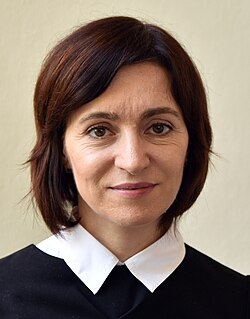 W
WThe Sandu Cabinet was a Cabinet of Moldova, led by Maia Sandu.
 W
WThe Second Cabinet of Alexis Tsipras was sworn in on 23 September 2015, following the Greek legislative election in September 2015. Alexis Tsipras, leader of Syriza, was sworn in as Prime Minister of Greece on 21 September, having agreed to re-form the coalition with Panos Kammenos and the Independent Greeks.
 W
WThe Sixth Labour Government has governed New Zealand since 26 October 2017. It is headed by Labour Party leader and Prime Minister Jacinda Ardern.
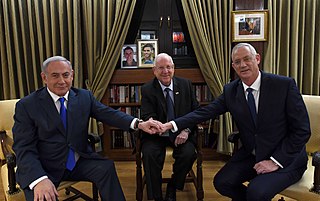 W
WThe thirty-fifth government of Israel is the current government of Israel, which was sworn in on 17 May 2020.
 W
WFollowing his victory in legislative elections held on 25 January 2015, the newly elected Prime Minister Alexis Tsipras appointed a new cabinet to succeed the cabinet of Antonis Samaras, his predecessor. A significant reshuffle took place on 17 July 2015.
 W
WThe United–Reform coalition government of New Zealand was the ministry that governed New Zealand from 1931 to 1935. It was a coalition between two of the three major parties of the time, the United and Reform, formed to deal with the Great Depression which began in 1929. The Labour Party refused to join the coalition, as it believed that the only solution to the depression was socialism, which United and Reform did not support. Rather, they attempted to solve the country's economic problems by cutting public spending. This, the policy of making the unemployed do relief work for the unemployment benefit, and other cost-cutting policies, made the government the most unpopular of its era, and it was defeated in the 1935 election.
 W
WThe Van Acker I Government was the government coalition in the Kingdom of Belgium from 1945-1946, after the fall of Hubert Pierlot's 6th coalition government in the aftermath of the Second world war. The government, with Achille Van Acker of the Belgian Socialist Party as Prime Minister, served for four months; from the restoration of democracy until June 15, 1945. Van Acker would form another coalition, which would serve for six months until the 1946 Belgian general election.